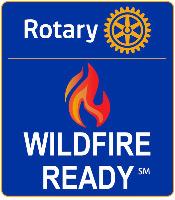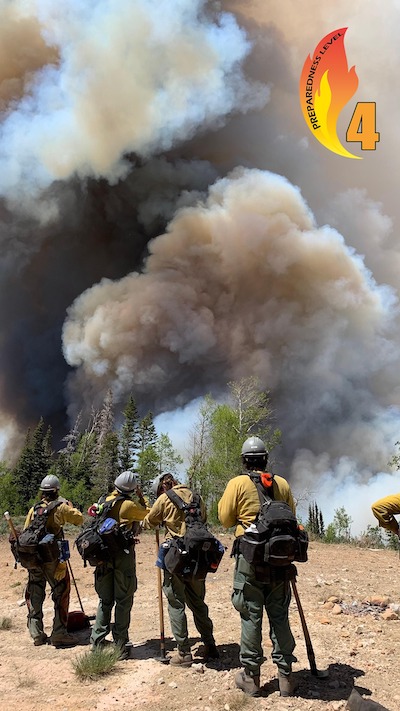- Posts: 69
- Thank you received: 0
- Forum
- Life Up the Hill
- Community News, Events, and Calendar
- The National Preparedness Level has been elevated to Preparedness Level 4
The National Preparedness Level has been elevated to Preparedness Level 4
- RotaryWildfireReady
-
 Topic Author
Topic Author
- Happy Camper
-

In the last 20 years, 2002, 2008, and 2012 are the only previous fire years when the National Preparedness Level has been increased to PL4 in the month of the June. Since 1990, today is the second earliest we have increased to PL4. #FireYear2021
Photo: Weber Basin Civilian Conservation Corps members observe the Bennion Creek Fire in Utah on June 9, 2021. Photo from InciWeb.
From the National Interagency Fire Center
www.rotarywildfireready.com/
In our mountain communities, wildfires are a major hazard. Residents are urged to take steps now to assess their wildfire risk, safeguard their homes and prepare for wildfire. You not only increase the safety of your property, but more importantly, you increase the safety of your family. We can help! See our website for helpful resources and information.
Please Log in or Create an account to join the conversation.
- RotaryWildfireReady
-
 Topic Author
Topic Author
- Happy Camper
-

- Posts: 69
- Thank you received: 0
Two things you need to know if you live in the CO Front Range area:
- Ask any firefighter and they'll tell you it's not a matter of if, but when, we have a large fire here. Remember, the Hayman Fire burned an area as large as Elk Creek Fire's district in one 24 hour period, and that was before 20 more years of growth and continued drought. The East Troublesome Gulch could just as easily happen again (it grew 100K+ acres at night and jumped the Continental Divide - two things that we used to think would never happen) and it would take out North Fork/Pine Grove or Bailey to Evergreen just as fast.
- Our communications infrastructure and roads are wholly inadequate for an emergency, the ONLY thing that will save you if we have a fast-moving fire is to evacuate as early as possible (don’t wait for the call, go as soon as you feel uncomfortable, or sooner).
Be hardening your homes, mitigating your private property, and pushing our elected officials to put more money and effort toward communications infrastructure, road improvements, and mitigation of our public lands now. Mitigation won’t be done in our lifetimes, but homes that have been hardened and mitigation done around them means they might be saved in a smaller fire, and it buys you, your loved ones, and your neighbors precious time to get out.
For info on how to harden your home and create defensible space around it, see all the info posted on our website, www.rotarywildfireready.com/ . If you live in Elk Creek Fire Protection's district, Inter-Canyon Fire Protection's district, Genesee Fire's district, or Evergreen Fire/Rescue's district, ask them to conduct a Home Assessment for you (it's $100, but they spend hours assessing your home's wildfire risk and preparing a report with recommendations for you to complete. If you complete those tasks, some insurance companies are giving discounts for it - call your insurance agent to ask).
Sign up for emergency alerts from CodeRED and My Mountain Town so you get the earliest heads-up and the most amount of time to prepare, and stay informed during an event of what's happening. Follow the official agency accounts we have listed on our website (pre-evacuation preparations page under the Go! tab) for more information. Have your [older] kids register their phone numbers as well so they receive the alerts at the same time.
Have a family plan for evacuation and reunification, and your Go Bags ready at all times. Pack with the mindset that you'll be evacuated for days or weeks, and what would you need for that length of time.
Inventory your home now by taking video of each room and everything in it, and have documentation saved on a thumb drive for every large purchase you'd need to claim. Review your insurance coverage to ensure it's adequate.
We face a daunting issue, but together we can make a difference for each other and our community.
#BeFireWise #BePrepared
Sarah Lee's post:
I've been sharing posts recently about the issues facing wildland firefighters, but just want to warn you about and prepare you for a few things this year:
1.) Large swaths of the western and midwestern states are in drought conditions. In eastern Montana alone, we are experiencing fire activity in mid-June that is typically seen only every 4-6 years in late August.
2.) Federal wildland fire agencies are the most short staffed they have been in my 21-year career for various (albeit important) reasons. This includes crews, aircraft and dispatchers. When we ask for help it simply will not be there. Our system is setup to leverage your tax dollars by relying on our five federal wildland fire agencies and state/local government responders. This means we are dependent on using personnel from across the nation - but we don't have solutions if they don't exist due to 40 years of government reduction and vacancies.
3.) We cannot easily obtain the supplies and services our firefighters usually expect due to supply chain issues and contracting changes (everything from rental cars to port-a-potties to chainsaw parts).
4.) Due to continued national requirements for reporting, mapping, data programs, etc. We now must have high-speed internet access and that does not exist where wildland fires occur. Oddly it seems more difficult to obtain than it was even 5 years ago. This is not a luxury.
5.) Due to climate change, fire seasons that were traditionally 3-4 months long are now 12 months and the typical pattern of only having 1-3 geographic areas of the US with high fire activity has become 4-6. This isn't sustainable with funding models that only hire and limit many firefighters to 3 months of the year.
6.) Due to COVID-19 and several years of 12-month/nationwide fire seasons, our employees are burnt out to the point of losing their families through divorce, dying in the line of duty, and committing suicide.
I could go on, but fair warning to all my friends and family. The system the nation has relied on to fight wildland fires and respond to numerous other disasters (since the 1970s) is broken. My colleagues will probably continue to kill themselves (some slowly through years of extreme stress and 18 hour days) to try to "patch" the system to save your community, your home, and your favorite vacation spots.
But know that this year will likely be catastrophic and be prepared. For most it is not too late to firewise your home, be vigilant with campfires/dragging trailer chains/sparks, and make a plan for what your family will do if you have to evacuate. Lastly, please do not blame the people who are sacrificing everything (some for only $13/hour).
www.rotarywildfireready.com/
In our mountain communities, wildfires are a major hazard. Residents are urged to take steps now to assess their wildfire risk, safeguard their homes and prepare for wildfire. You not only increase the safety of your property, but more importantly, you increase the safety of your family. We can help! See our website for helpful resources and information.
Please Log in or Create an account to join the conversation.
- Forum
- Life Up the Hill
- Community News, Events, and Calendar
- The National Preparedness Level has been elevated to Preparedness Level 4








